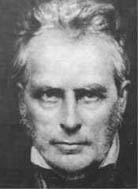
Understanding Exclusive Brethren
 The Exclusive Brethren are a breakaway from the Plymouth Brethren, a group which originated in Dublin, but formed its first congregation in Plymouth in 1831.
The Exclusive Brethren are a breakaway from the Plymouth Brethren, a group which originated in Dublin, but formed its first congregation in Plymouth in 1831.
The origins of the Plymouth Brethren were essentially informal, with a desire to return to the simplicity of apostolic days and worship, and to break down the walls that divided Christians. Edward Cronin, a medical student at Trinity College, Dublin, withdrew from church attendance for a time because he was refused Communion unless he entered into membership with one of the dissenting churches. This he regarded as a denial that "the church of God was one, and that all that believers were members of that one Body." Joined by a small group of like-minded persons, he met with them "for breaking of bread and prayer" in a private house.
The character of the meetings created great interest and many more attended to inquire further and learn from Scripture. As numbers grew, a room was hired to accommodate the people. John Nelson Darby was the outstanding teacher. Meetings showed a deep devotion to Christ and a zeal for evangelism. A.N. Groves, another leader, became concerned at the dominance of Darby and warned him against strengthening the very elements of legalism from which they had withdrawn, but Darby did not heed his words.
Disagreement later broke out between Darby and another teacher, B.W. Newton, over prophetic interpretation and Newton's teaching on Christ's humanity. Two members of the Plymouth church applied for fellowship at Bethesda Chapel, Bristol, where George Müller and Henry Craik were joint pastors. Some demanded that they be refused as unsound because they hid sat under Newton. The elders, however, claimed the right to examine visitors for themselves to ascertain if they actually held false doctrine.
Darby pressed for division, and those who followed him broke off all relations with those who agreed with Bethesda. From 1848 the Brethren became two distinct groups, the mainstream of the movement (Open Brethren) maintaining its original principles, while the Darbyist group (Exclusive Brethren) became increasingly centralised in government and separatist in relation to other Christians.
Exclusive Brethren have had several divisions among themselves, these coming to a head in recent times through the extremist teachings of James Taylor (d. 1970). There are other, smaller much less extreme groups, in no way associated with Taylorism and who repudiate its doctrines. Many of these are hardly distinguishable from Open Brethren.
The Exclusive Brethren stay separate from all others - not only from unbelievera in general, but from any Christians who do not belong to their group. In contrast, Open Brethren are involved with other churches in joint evangelistic outreach and, in many areas, share in the ecumenical Religious Education program in the local schools.
© Peter J Blackburn, 1991,1999. This material was originally prepared for Antioch School. Permission is given for the printing and use of this material by congregations and individuals.